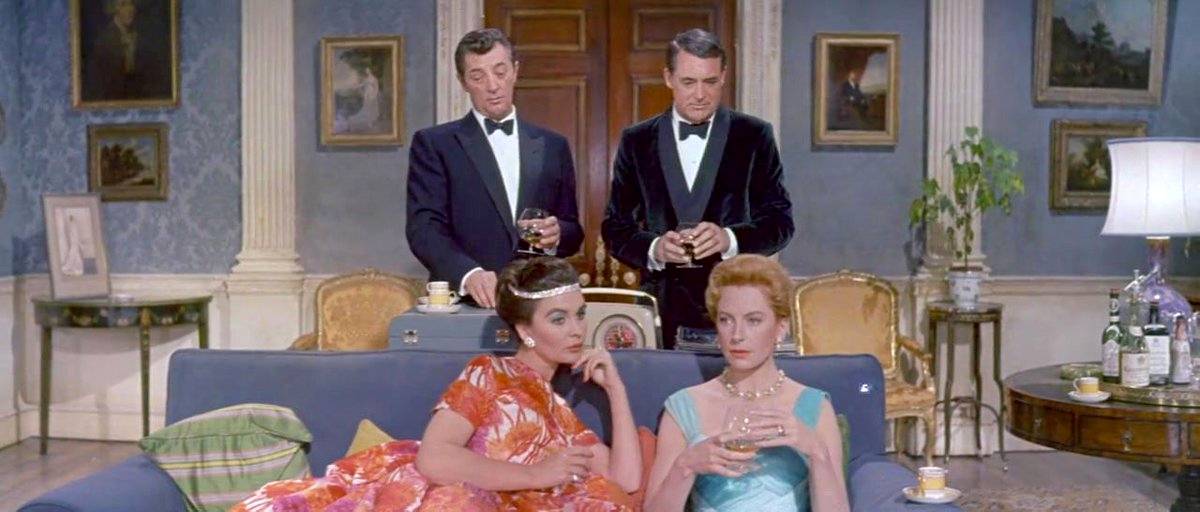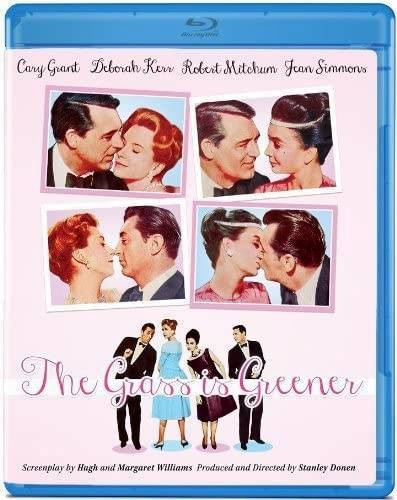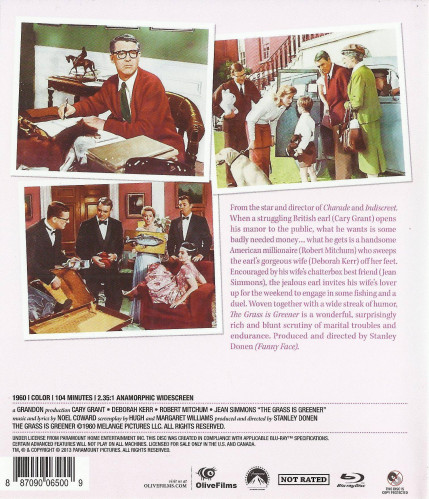THE GRASS IS GREENER [1960 / 2013] [Blu-ray] [USA Release]
A Four Sided Triangle That Proves Variety Is The Spice Of Love!
From the director of ‘Charade’ and ‘Indiscreet.’ When a struggling British Earl Victor Rhyall [Cary Grant] opens his manor to the public, what he wants is some badly needed money. What he gets is a handsome American millionaire Charles Delacro [Robert Mitchum] who sweeps the earl's gorgeous wife Lady Hilary Rhyall [Deborah Kerr] off her feet. Encouraged by his wife's chatterbox best friend Hattie Durant [Jean Simmons], the jealous Earl Victor Rhyall invites his wife’s lover up for the weekend to engage in some fishing and a duel. Woven together with a wide streak of humour. ‘THE GRASS IS GREENER’ is a wonderful, surprisingly rich and blunt scrutiny of marital troubles and endurance. Produced and directed by Stanley Donen [‘Funny Face’].
FILM FACT No.1: Awards and Nominations: 1961 Golden Globes: Nominated: Best Motion Picture Comedy. Nominated: Best Actor in a Comedy or Musical for Cary Grant. 1961 Laurel Awards: Nominated: Golden Laurel Award for Top Comedy [5th place]. Nominated: Golden Laurel Award for Top Female Comedy Performance for Jean Simmons [5th place].
FILM FACT No.2: The screenplay was adapted by Hugh Williams and Margaret Vyner from the play of the same name which they had written and found success with in London's West End. Originally Cary Grant turned down the role of Victor. Afterwards the role was subsequently offered to his friend Rex Harrison and he accepted. However right before production began, Rex Harrison's wife Kay Kendall fell gravely ill and he was forced to leave the production in order to tend to her. Grant, out of respect for cast and crew, and to keep the filming running according to schedule, decided then to finally take the part. was originally intended by director Stanley Donen that Cary Grant would play the part of Delacro, the American tourist, while Rex Harrison and Kay Kendall were respectively cast as “Victor Rhyall” and “Hattie.” But Kendall died soon after completing an earlier Stanley Donen film, Once More, with Feeling!, and Harrison dropped out of the film because of this. Cary Grant agreed to play Victor instead of Delacro, and both Rock Hudson and Charlton Heston were approached about playing the American character. Both refused, and Robert Mitchum was cast quite late in the proceedings, making no fuss at all about taking third-billing. Cary Grant often claimed this had "saved the film" and praised his performance highly. Most of the cast had worked together a number of times before. It was the third of four movies that paired Deborah Kerr and Robert Mitchum, the third time Jean Simmons had worked with Kerr and Robert Mitchum, and Cary Grant's third collaboration with Deborah Kerr. They had previously worked together on ‘Dream Wife’ [1953] and ‘An Affair to Remember’ [1957]. Moray Watson was the only member of the original stage cast to be retained for the film version. British interior decorator Felix Harbord served as the film's special consultant for settings. Osterley Park was used as the location for the stately home.
Cast: Cary Grant, Deborah Kerr, Robert Mitchum, Jean Simmons, Moray Watson, Joan Benham (uncredited), Aileen Lewis (uncredited), Leonard Llewellyn (uncredited), Elisabeth Orion (uncredited), Terry Sartain (uncredited), Alecia St Leger (uncredited) and Gwen Watford (uncredited)
Director: Stanley Donen
Producers: Stanley Donen, Cary Grant (uncredited) and James H. Ware
Screenplay: Hugh Williams (screenplay/play) and Margaret Vyner (screenplay/play)
Music and Lyrics: Noël Coward
Composer: Douglas Gamley (Additional Music) (uncredited)
Costume and Wardrobe: Hardy Amies [clothes for Miss Deborah Kerr], Christian Dior [clothes: Miss Jean Simmons] and John Wilson-Apperson [wardrobe supervisor]
Cinematography: Christopher Challis, B.S.C., F.R.P.S. (Director of Photography)
Image Resolution: 1080p (Technicolor)
Aspect Ratio: 2.35:1 (Technirama)
Audio: English: 1.0 DTS-HD Master Audio
Subtitles: None
Running Time: 104 minutes
Region: Region A/1
Number of discs: 1
Studio: Universal International / Olive Films
Andrew’s Blu-ray Review: ‘THE GRASS IS GREENER’ [1960] opens with some clever credits in which the duties of those credited are sort-of acted out by babies. For example, when the cinematography credits are on screen we see a couple of the little tots playing with a toy camera, and when the director credit appears we see one little chap yawning hugely. It’s a cute, ingenious start to a middling movie which finds it impossible to shake off its stage origins and suffers from a memorably poor piece of casting.
After that rather slow opening half-hour, the movie becomes more interesting as it comes to grips with its real subject matter. A sophisticated battle of wills emerges from a near-farcical situation, and almost every line of the clever script has a double-meaning. Grant, in particular, has a lot of fun with this verbal sparring, easily running rings around Mitchum, who at times seems almost bovine by comparison. Deborah Kerr, with her cut-glass accent and English Lady manners seems an unlikely object of two men’s desire, and she comes across as too much of a together person to persuade us of the vacillating nature of her character.
‘THE GRASS IS GREENER’ is directed by Stanley Donen and stars Cary Grant, Robert Mitchum, Deborah Kerr and Jean Simmons. It's adapted by Hugh Williams and Margaret Vyner from the play of the same name which they had both written and found success with in London's West End theatre venues.
Struggling financially, the British Earl Victor Rhyall [Cary Grant] and the earl's gorgeous wife Lady Hilary Rhyall [Deborah Kerr] start giving tours around their stately mansion. Enter Charles Delacro [Robert Mitchum] and Hattie Durant [Jean Simmons], whose appearance at the mansion sets in motion the wheels of love, jealousy and machismo fuelled duelling.
‘THE GRASS IS GREENER’ was considered too talky on its release, but is fair to say, the film is sort of aimed at people who enjoy seeing plays in the theatre, or for those who are romantics at heart. Upon first viewing the film doesn't appear to have much in the way of comedy, in fact when Grant is either off screen or out of ear shot there's a hole as big as the implausibility factor in the plot. However, further viewings as well as listening really, reveal a sharper script than the one critics gave credit for back in the day. There's plenty of "nudge nudge wink wink” going on, while the portrayals of the rich American and British characters are very astute and very well presented for a film released in the 1960’s era.
On the cast front, Cary Grant is as smooth and classy as he always is, with his sometimes undervalued comedy timing here in full force. Deborah Kerr and Jean Simmons look very attractive and very stylish, with the latter benefiting greatly from some outrageously wonderful Dior costumes. While Robert Mitchum, though no master of comedy works his laconic low tone charm to great effect off of Cart Grant's well-spoken aristocrat nobility. However, look away from the big four heading the cast and you find much comedy value in Moray Watson as the Butler. He, along with Christopher Challis' photography inside of the house, is arguably the stars of the show. A fine film for the people who enjoy a much more slowly paced film that grows on you, but with wonderful witty and very tongue in cheek dialogue.
The film's clever screenplay by Hugh Williams and Margaret Vyner, tries to make some intelligent commentary about the institution of marriage, and throws in some remarks about the differences between British and American sensibilities and nimbly repurposing their own play, keeps the plot plugging along at a slow but subtly rising pace, with an opening poking fun at vacant tourists and the upper class elite stubborn enough to cling to the antiquated decadence of their heritage while begrudgingly opening their historic homes to the riff raff for sustainable income. However, as the conflict settles in, enough genuinely surprisingly twists and turns and pockets of action pop up for the film to never feel excessively talky. It's also impressive how cavalier the film is about its central infidelity conflict and arguably more controversial and the motivations behind sustaining a strained marriage. Mercifully absent is the implicit judgement in many comparable narratives released in the thick of the Hays Code, making the film feel much more like a story than an ideologically spring-loaded cautionary tale.
Unsurprisingly, the film's main draw is its terrific Hollywood mega stars comprising the central love triangle, the allure of whom Stanley Donen cheekily demystifies by introducing them as squabbling babies over the opening credits. However, rather than awards-baiting scene-chomping, Cary Grant, Deborah Kerr and Robert Mitchum all turn restrained, deadpan performances. This is a British comedy of manners, after all, and acting out would be intolerably uncouth. Nonetheless, all three possess such natural star magnetism that, when armed with the script's arsenal of clever double-entendres, makes them eminently watchable throughout the film.
An uncomfortable situation unwinds to its full satirical potential and helps ‘THE GRASS IS GREENER’ unpacks lots of social performativity with deft ease. Fans of the cast or those seeking an old-fashioned jaunt with a slyly contemporary edge are cordially invited to experience the distinct pleasure of visiting this stately home of England.
Deborah Kerr is bright and vulnerable, Jean Simmons, pert and sophisticated, Robert Mitchum, cool and crafty, and Cary Grant urbane and witty. It's fun to see this quartet trading double entendre and quaint quips. Stanley Donen does his best with a stagy script, relying on his experienced cast to carry off the humour and action. It succeeds nicely, and it’s downright fun to follow their stylish jousts.
Overall, ‘THE GRASS IS GREENER’ is a stylish film which those who watch to the very end will find more rewarding than those who give up halfway through.
* * * * *
Blu-ray Image Quality – Universal International and Olive Films presents us the film ‘THE GRASS IS GREENER’ with a wonderful and colourful 1080p Technicolor image and has an equally impressive 2.35:1 Technirama aspect ratio. The film image is in a very good general condition, the opulent settings of inside of the Earl Victor Rhyall palatial mansion décor is beautifully rendered with lots of subtle colours and the clothes, especially worn by female actors look really wonderful and stylish. While on the older side, there is nothing outstandingly wrong with this Blu-ray presentation other than a lack of razor-sharp clarity and detail inherent to the film itself. Olive Films has brought you a film with very good fine detail and giving us a viewing experience that is devoid of any annoying digital tweaking. So sit back and enjoy this very enjoyable visual experience.
Blu-ray Audio Quality – Universal International and Olive Films brings us the film ‘THE GRASS IS GREENER’ with just one standard 1.0 DTS-HD Master Audio experience. Suffice to say, most of the film is more dialogue orientated and you hear every word the actors speak very clearly, as well as the composed film score and at the start of the song we get to hear the famous tongue in cheek theme song by Noël Coward which sums up a very British stiff upper lip characters we get to see in the film and sets up the theme of the film really well. The soundstage has a nice bloom with decent extension. While listed as mono, this is possibly a narrow stereo mix. So sit back and enjoy this very enjoyable audio experience.
* * * * *
Blu-ray Special Features and Extras: Olive Films felt no special features should be included on this Blu-ray release; they could have at least included the Original Theatrical Trailer.
Finally, ‘THE GRASS IS GREENER’ is bookmarked by a cheery chorus extolling the joys of “the stately homes of England” in Stanley Donen's ‘THE GRASS IS GREENER’ at first promises to be a pleasantly rich, thoroughly British comedy of manners, repartee and archly subtle barbs ready that really suits this film. The film elicits a very comfortable a viewing state, in fact, that it takes some time to clue into the slow, inextricable escalation evolving on screen. The final result is an impressive transformation indeed: a sly, witty affair (pun intended) that, while unpacking the virtue of old-fashioned sensibilities, demonstrates a markedly modern undercurrent of risqué subtext and the place of tradition and posterity in the twentieth century. The Stanley Donen's film is a charming and sophisticated satire, without ever becoming stuffy or unengaging and most importantly, it is highly enjoyable through and through. Highly Recommended!
Andrew C. Miller – Your Ultimate No.1 Film Aficionado
Le Cinema Paradiso
United Kingdom



